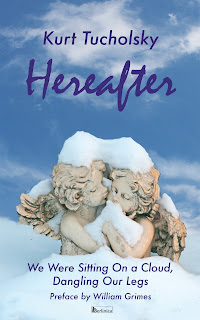On December 21 in 1935, Kurt Tucholsky, the famed German Jewish
satirist, journalist, poet, author, and playwright took his own life in Swedish
exile. Tucholsky had left Germany for France, then Sweden even before the Nazis
came to power, knowing that they would be after him and that their rise would
lead to dictatorship and war. He had tried to defend his editor Carl von
Ossietzky who was persecuted for treason, but to no avail. His books were among
the first to be burned at the Opera Square in Berlin.
But the acid critic also had a whimsical, spiritual side, and we experience it in the book "Hereafter. We Were Sitting on a Cloud, Dangling Our Legs". "Hereafter" was originally a loose series of humorous short stories. Tucholsky wrote them between 1925 and 1928, while he was on assignment in Paris for his paper, Die Weltbühne (The World Stage). This is the first time these stories are collected in a book — adorned with pictures of little angels from Berlin's cemeteries —, and also the first time they are translated into English.
In these stories, Tucholsky imagines himself after he died, sitting on a cloud, and watching earth from afar. Right from the start he finds a friend who shows him around in heaven; clouds one can mess with and crumble, floating spirits and grumpy ghosts, masquerade balls on lunar satellites, quivering astral lights, meteors flying by and twinkling stars, with an avant-garde Earth Cinema, a Mountain of Laughter with "cascades of laughter, snickering streams, bleating laughter and the gleeful laughter of children, and trickles of laugh-tears dripping by," and a sanatorium where the water itself is being cured. And, of course, "He" is invisibly present, a pedantic God who counts everything uses the weather to punish people and invites interesting new souls to receptions. Tucholsky's Alter Ego and his newly found friends also talk a lot about the life they left behind, and how it was when they still had it. It sounds like this:
But the acid critic also had a whimsical, spiritual side, and we experience it in the book "Hereafter. We Were Sitting on a Cloud, Dangling Our Legs". "Hereafter" was originally a loose series of humorous short stories. Tucholsky wrote them between 1925 and 1928, while he was on assignment in Paris for his paper, Die Weltbühne (The World Stage). This is the first time these stories are collected in a book — adorned with pictures of little angels from Berlin's cemeteries —, and also the first time they are translated into English.
In these stories, Tucholsky imagines himself after he died, sitting on a cloud, and watching earth from afar. Right from the start he finds a friend who shows him around in heaven; clouds one can mess with and crumble, floating spirits and grumpy ghosts, masquerade balls on lunar satellites, quivering astral lights, meteors flying by and twinkling stars, with an avant-garde Earth Cinema, a Mountain of Laughter with "cascades of laughter, snickering streams, bleating laughter and the gleeful laughter of children, and trickles of laugh-tears dripping by," and a sanatorium where the water itself is being cured. And, of course, "He" is invisibly present, a pedantic God who counts everything uses the weather to punish people and invites interesting new souls to receptions. Tucholsky's Alter Ego and his newly found friends also talk a lot about the life they left behind, and how it was when they still had it. It sounds like this:
“The strangest part is,” I said, “to think that you did this thing or that for the last time in your life. One of those times had to be the last time. One year on February fourteenth was the last time you got into a car …And no one knows, of course. Only operas have finales. You get into a car, comfy, drive, get back out, and never know that’s the last time. Because then maybe your illness sets in, your long confinement in bed …no more cars, ever. Last time in your life you were eating sauerkraut. Last time making a phone call. Last time making love. Last time reading Goethe. Maybe even years before your death. You never know.”In Tucholsky's heaven, souls can have a second chance and be reborn if they want to — they should just not forget to have their memories wiped out. Seventy years later, they will come back, somewhat embarrassed and wiser. For their angelic friends on the cloud, bathing in the sunlight, waiting for them, the time has not passed.
“But it’s good, not knowing,” he said, “isn’t it?”
“Maybe,” I said. “But every time you do something, you should think, ‘Do it well. Savor it. It might be the last time.’”















